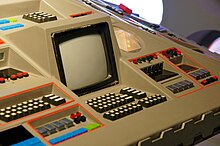It has been suggested that List of fictional artificial intelligences be merged into this article. (Discuss) Proposed since March 2024.
This article includes a list of general references, but it lacks sufficient corresponding inline citations. Please help to improve this article by introducing more precise citations. (February 2023) (Learn how and when to remove this template message)

Computers have often been used as fictional objects in literature, movies and in other forms of media. Fictional computers may be depicted as considerably more sophisticated than anything yet devised in the real world. Fictional computers may be referred to with a made-up manufacturer's brand name and model number or a nickname.
This is a list of computers that have appeared in notable works of fiction. The work may be about the computer, or the computer may be an important element of the story. Only static computers are included. Robots and other fictional computers that are described as existing in a mobile or humanlike form are discussed in a separate list of fictional robots and androids.